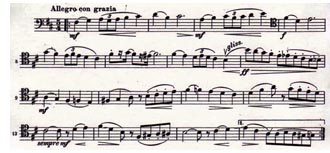| Sun | Mon | Tue | Wed | Thu | Fri | Sat |
|---|---|---|---|---|---|---|
| 1 | 2 | 3 | 4 | 5 | ||
| 6 | 7 | 8 | 9 | 10 | 11 | 12 |
| 13 | 14 | 15 | 16 | 17 | 18 | 19 |
| 20 | 21 | 22 | 23 | 24 | 25 | 26 |
| 27 | 28 | 29 | 30 | 31 |
CATEGORIES
RECENT ENTRIES
BLOG ROLL
Like, Tchaikovsky funny?
“Tchaikovsky’s funny because you think the third movement is the end because it’s so big, and then you get to the fourth and it’s just like, ‘Oh.’”
Not exactly my idea of comedy, but that quote from a friend, after Saturday’s University Symphony Orchestra concert, is actually a pretty good way to summarize the 19th-century composer’s sixth symphony, Pathétique.
The orchestra’s third concert of the year—billed as Tchaikovsky’s Tapestry—opened in a big way. Conductor Barbara Schubert, X'79, led with the 45-minute-plus symphony and finished with fanciful and sweet excerpts from Swan Lake. As Schubert explained to the audience, it was too cold to leave with a piece as strong and serious as Pathétique.
Going into the concert, I was nervous. It’s not that I don’t like classical music; I played an instrument in high school just like everyone else at this university. It was the bassoon. Oh, I was good—sort of. Anyhow, I’ve been to my share of Chicago Symphony concerts, and if I’ve learned anything, it’s that you can’t go into a classical-music concert feeling sleepy. And I was sleepy Saturday night; that’s what four weeks of winter quarter will do to you.
 I arrived at Mandel Hall a few minutes early, and I was already worried. It was just the right temperature, just the right distance from the bright stage lights, and, in the opening moments of the symphony, just the right amount of bassoon solo to nearly lull me off to neverland.
I arrived at Mandel Hall a few minutes early, and I was already worried. It was just the right temperature, just the right distance from the bright stage lights, and, in the opening moments of the symphony, just the right amount of bassoon solo to nearly lull me off to neverland.
Fortunately, Tchaikovsky was smart enough to include an alarm clock in the middle of that first movement. A sudden crescendo shook me from the brink, and the rest of the performance passed without the dread of falling asleep.
The program notes provided a full explication of the symphony and the ballet excerpts; I found most interesting Tchaikovsky's general philosophy of wanting to “express something fully” through his music.
Although I’m still well short of being able to understand composers’ intentions merely by ear, maybe next time I’ll be able to catch Tchaikovsky’s jokes.
Jake Grubman, ’11
February 3, 2010
